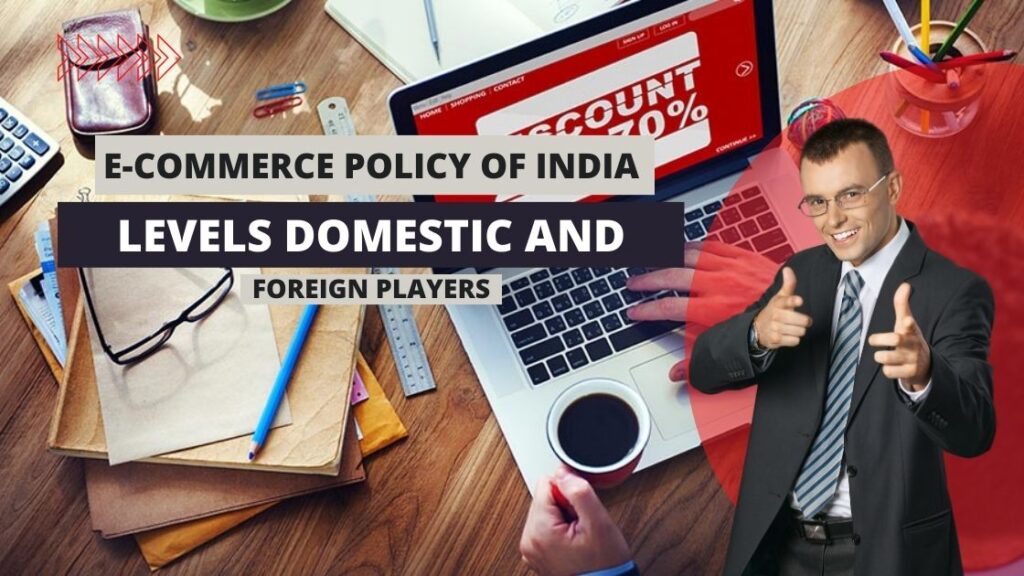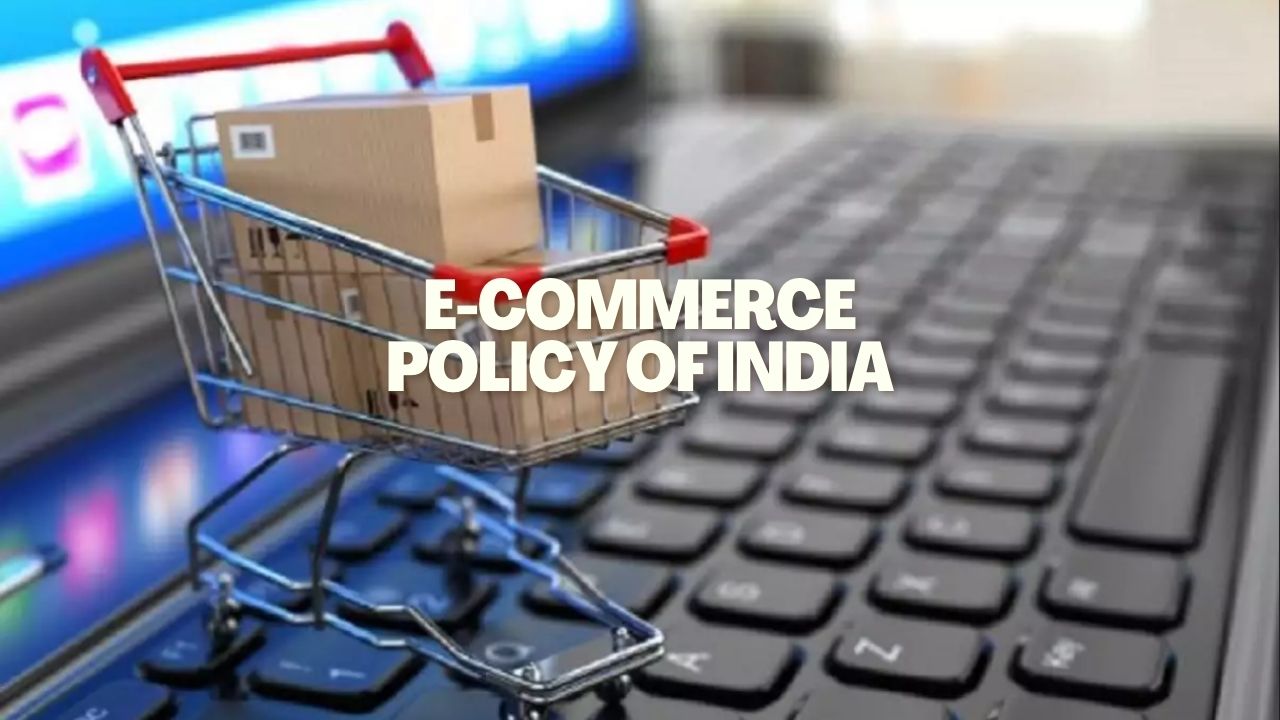The E-Commerce Policy of India has been a game changer in the way that businesses operate in the digital space. This policy holds great potential to revolutionize the way India does business and significantly increase economic growth. It has been designed to facilitate the digital transformation of India, promote entrepreneurship, create jobs, protect consumers, and bring more transparency to the e-commerce sector.
What is E-Commerce?
E-commerce is the buying and selling of goods and services over the Internet. It has revolutionized the way we shop, with more and more people turning to online shopping for convenience, variety, and affordability. With this shift to digital commerce, it has become increasingly important for governments to create policies that regulate e-commerce activities.
The E-Commerce Policy of India Introduced in 2019
In India, the National E-commerce Policy, 2019 was introduced as a draft policy in February 2019 by the Department for Promotion of Industry and Internal Trade (DPIIT). The policy seeks to address six broad themes:
- IT Act and Data Protection: E-commerce entities are required to adhere to the provisions of the Information Technology (Reasonable Security Practices and Procedures and Sensitive Personal Data or Information) Rules, 2011, as stipulated by the Information Technology Act, 2000.
These rules outline the obligations and responsibilities of e-commerce entities in ensuring the security and protection of sensitive personal data or information. Additionally, the Intermediary Rules 2011, also under the IT Act, govern the activities and content displayed on intermediary websites.
Furthermore, the European Union’s General Data Protection Regulation (GDPR), which came into effect in 2018, has implications beyond the EU borders. GDPR India extends its provisions to safeguard the data of EU citizens to all companies and organizations worldwide that engage in business with the EU.
Failure to comply with GDPR India can result in significant penalties, potentially amounting to €20 million or 4% of the annual global revenue of non-compliant entities. These penalties serve as a deterrent to encourage e-commerce entities to prioritize the protection of personal data and ensure compliance with GDPR India’s requirements.
The IT Act encompasses regulations governing the validity of electronic contracts, communication and acceptance of proposals, withdrawal of proposals, and contract formation among buyers, sellers, and intermediaries.
It also stipulates that the terms of service, privacy policy, and return policies of online platforms must be enforceable contracts. These provisions ensure that electronic transactions and interactions on online platforms adhere to legal requirements and provide a framework for enforceability and protection of the rights of all parties involved.

- FDI Policy: The Indian FDI Policy recognizes two models of e-commerce laws:
1. Marketplace Model: In this model, e-commerce businesses register on digital and electronic networks to facilitate transactions between buyers and sellers. The marketplace acts as an intermediary and charges sellers a commission for its services.
Naaptol and Shopclues are examples of prominent online marketplaces in India. Under the Government’s regulations on FDI in the e-commerce industry, FDI is allowed under the automatic route in the marketplace model.
2. Inventory Model: This model involves businesses engaging in online commerce using an inventory-based approach. These businesses maintain their own inventory of products and services, which they sell directly to customers. Sellers in this model source their products from brands and other sellers.
Myntra is an example of an inventory-based e-commerce platform. FDI is not permitted under the inventory-based model according to the Government’s regulations on FDI in the e-commerce industry.
According to the FDI policy outlined in the ‘Consolidated FDI Policy Circular 2015,’ FDI up to 100% is permitted under the automatic route in Business-to-Business (B2B) e-commerce laws. However, no FDI is allowed in Business-to-Consumer (B2C) e-commerce. Exceptions in B2C e-commerce include:
– Indian manufacturers can sell their products manufactured in India through e-commerce retail channels.
– Single-brand retail trading entities operating physical stores can engage in retail trading through e-commerce laws.
It is important to note that an Indian manufacturer selling its single-brand goods through e-commerce retail channels is considered legal. The investee business, which owns the Indian brand and manufactures at least 70% of its products in-house while sourcing a maximum of 30% from Indian manufacturers, qualifies as an Indian manufacturer under these circumstances.
- Payment and Settlements Act: A ‘payment system’ refers to a mechanism that enables the transfer of funds between a payer and a beneficiary. It includes processes related to payment but excludes clearing, payment, or settlement services, as well as stock exchanges. To operate as a payment system, an e-commerce company must comply with the relevant guidelines set by the Reserve Bank of India (RBI) regarding online payments.
In addition, for an intermediary operating an online e-commerce platform, it is necessary to have an operational Nodal Account. This account is utilized for settling the payments of the merchants on the platform through electronic means. By maintaining a Nodal Account, the intermediary becomes eligible to receive payments via electronic methods in accordance with the applicable regulations.

- Labelling & Packaging: To ensure compliance with applicable laws, an e-commerce business must meet the labeling and packaging requirements outlined by various legislations, including the Legal Metrology Act of 2009, the Food Safety and Standards Act of 2006, the Drugs and Cosmetics Act of 1940, and other relevant laws. As per the Legal Metrology Act of 2009, in conjunction with the Legal Metrology (Packaged Commodity) Rules, 2011, online platforms are obligated to provide essential details about the products being displayed.
Under these regulations, the e-commerce platform must include necessary information on the product page itself, such as size, weight, and other relevant attributes. This ensures that consumers have access to accurate and comprehensive product information before making a purchase decision. By adhering to these requirements, e-commerce businesses demonstrate their commitment to consumer protection and regulatory compliance.
- Sales, Shipping, Refunds, and Returns: The Sale of Goods Act of 1930 governs the information that an entity’s sales and shipping policy must provide. This includes details about guarantees, terms, and the transfer of ownership in commodities. Additionally, the policy should clearly indicate whether return or refund options are available to customers or not. Adhering to these requirements ensures transparency and provides customers with essential information to make informed purchasing decisions.
- Intellectual Property: Securing trademarks and copyrights for intended products, texts, and symbols is imperative. India has established a robust legal and regulatory framework for protecting intellectual property (IP) rights. However, there is still a need for comprehensive updates to ensure maximum efficacy in the virtual realm. Currently, the laws do not encompass specific provisions to prevent domain name deception and misuse, apart from a limited number of judicial pronouncements.
While India’s IP laws provide adequate protection for trademarks and copyrights, the dynamic nature of the virtual world necessitates continuous advancements in legislation. The absence of precise laws addressing domain name deception and misuse leaves room for uncertainties and potential infringements. Nevertheless, certain judicial pronouncements have attempted to address these concerns.
Efforts are underway to bridge these gaps and modernize the legal framework to cater to the evolving virtual landscape. It is crucial for businesses and individuals to remain vigilant and well-informed about the existing legal provisions and any developments in IP protection. This ensures the effective safeguarding of their rights in the ever-changing digital environment.
E-Commerce Policy of India for Domestic and Foreign Companies

The policy aims to promote a level playing field between domestic companies and foreign players in the Indian e-commerce sector.
For example, Amazon and Flipkart have been barred from selling products of companies in which they have a stake or their group companies. This regulation prevents the e-commerce platforms from exerting undue influence on the pricing and control of inventory for such sellers.
Protects Consumer Interests
It also seeks to protect consumer interests by introducing rules such as:
- Entering into written contracts with entities before soliciting sales on their platforms: Contracts with clear terms and conditions for the transaction between the seller and the consumer can help both parties can understand their rights and obligations in the transaction, minimizing misunderstandings and disputes.
They also provide a legal framework to protect the interests of consumers. They outline important aspects such as product specifications, delivery terms, warranties, return policies, and dispute-resolution mechanisms. These provisions ensure that consumers are adequately informed and protected when engaging in online purchases.
Making these contracts legally enforceable means that if either party fails to fulfill their obligations as outlined in the contract, the other party can seek legal remedies. This gives consumers a means to seek redress in case of breaches or fraudulent activities.
Standardized contract terms also ensure fairness and equal treatment of consumers. It prevents businesses from imposing unfair or one-sided terms that may disadvantage consumers. Rules and regulations governing contracts in e-commerce platforms often include provisions that protect consumers from unfair practices.
- Ensuring transparency in pricing: India’s e-commerce policy aims to prevent price manipulation. Transparent pricing rules help prevent unfair practices by e-commerce sellers. It ensures that consumers are not subjected to arbitrary or discriminatory pricing tactics that can exploit their lack of information or bargaining power.
It also enables consumers to compare prices across different sellers or platforms, allowing them to make informed purchasing decisions. When pricing information is readily available, consumers can assess the value and affordability of products, promoting competition and driving down prices.
Clear and transparent pricing rules help consumers avoid unexpected or hidden costs. By disclosing all relevant charges upfront, such as taxes, shipping fees, or additional surcharges, consumers can accurately assess the total cost of the purchase before making a decision.
- Preventing discriminatory behavior against sellers: It is expected that the new e-commerce policy will have rules to ensure a level playing field for all sellers, preventing unfair advantages or disadvantages based on arbitrary factors. By promoting fair competition, e-commerce platforms create an environment where sellers can compete based on the quality of their products, services, and customer experience, rather than discriminatory practices.
All sellers, regardless of their size, background, or resources, deserve equal opportunities to reach consumers and market their products. Proper rules will prevent larger or more established sellers from dominating the platform and stifling competition, allowing smaller or newer sellers to thrive.
It will also ensure that the e-commerce platforms cannot target certain sellers based on factors such as race, ethnicity, gender, nationality, or any other protected characteristic. They will have to be transparent about their policies, algorithms, and decision-making processes.
Finally, the national e-commerce policy of India will also include measures to prevent monopolistic behavior or abuse of market power by dominant sellers or platforms. These measures aim to protect smaller sellers from being unfairly marginalized or excluded from the marketplace, ensuring healthy competition and diversity.
Good for Small Businesses

The policy seeks to provide an enabling environment for small businesses by ensuring access to technology, capital, and global markets. It will also:
- Create special e-commerce zones that will provide tax incentives and other benefits to small businesses so they can better compete with larger foreign corporations/
- The policy stipulates that foreign e-commerce companies must invest 25 percent of their total sales in India in research and development activities, which will help local businesses gain access to new technologies.
- The policy provides a framework for the taxation of e-commerce activities and encourages online payments through digital wallets to reduce cash transactions.
- It seeks to promote exports by encouraging cross-border data flows and allowing companies to set up warehouses and other infrastructure to facilitate e-commerce.
All these initiatives are intended to help small businesses compete in the digital economy while protecting consumer interests.
Why should MBA students learn about the E-Commerce Policy of India?
For MBA students studying business strategy or operations management, understanding how e-commerce policies can impact their business is essential. They need to be aware of how these regulations can affect their operations regarding pricing strategies, customer service standards, data security measures, etc., so they can stay ahead of the competition.
Furthermore, they must also be able to anticipate any changes in government regulations that may affect their business model or strategy in order to remain competitive in the long run.
Latest News
The government is continuously working towards refining the E-Commerce Policy of India by framing rules under the Consumer Protection Act which will help protect consumers from unfair practices such as false advertising or misleading information about products/services being sold online.
This will help ensure that customers can access safe and secure online shopping experiences while allowing businesses to operate within a well-regulated environment.
Overall, understanding how e-commerce policies work is vital for MBA students who want to stay informed about current trends in digital commerce and develop skills that will help them succeed in this dynamic industry.
By keeping up with changes in government regulations related to e-commerce activities, MBA students can gain valuable insights into how they can better manage their businesses while protecting consumer interests at the same time.





